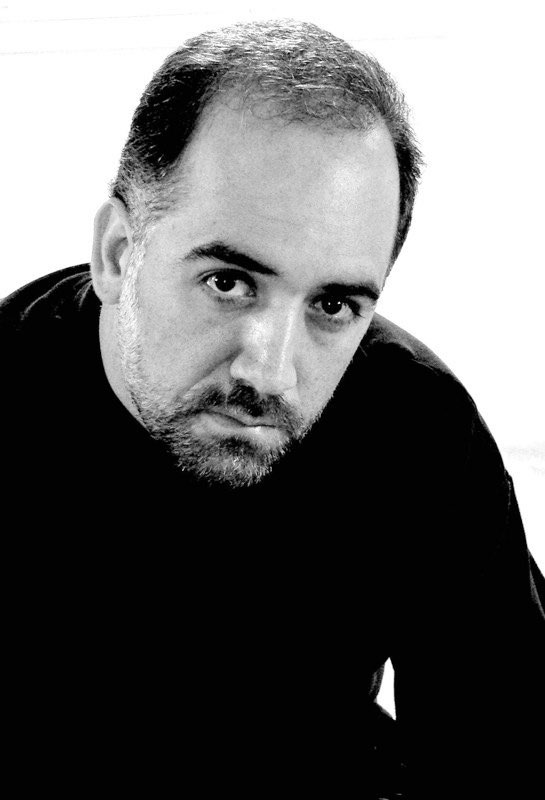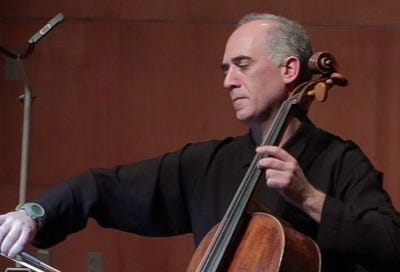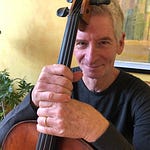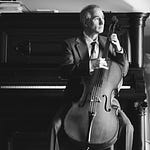…There are not that many 48 year old cellists.”
010 Pablo Mahave-Veglia

Transcript:
Pablo Mahave-Veglia: In my upbringing it was something that was expected from everybody: we were expected to read books, we were expected to have opinions about politics, and we were expected to pick up an instrument. Then I realized it was... you grow up and meet the world and not everybody has that expectation.
[intro]
Trevor Exter: You're listening to play it like it's music, exploring the lives and craft of the people who play. Today my guest is Pablo Mahave Veglia, cello professor at Grand Valley State University in Michigan and a total pro. We get into it here, the guy knows his stuff on the cello: all the notes, all the styles, all the periods, all the positions. We get a tour of his instruments and a look at his fascinating life story. Check him out. State your name and instrument
Pablo Mahave-Veglia: Sure I'm Pablo Mahave Veglia and I'm a cellist.
Trevor Exter: Why do you play music?
Pablo Mahave-Veglia: Oh gosh at this point I have no other skills! I don't want anybody to know this, but I would do it if I didn't get paid.
Trevor Exter: We won't tell anybody.
Pablo Mahave-Veglia: I know exactly, because I could use the money. It pays the bills. I think it's part of, it became a need in my upbringing, it was something that was expected from everybody, that we were expected to read books, that we were expected to have opinions about politics, and we were expected to pick an instrument Then I realized you grow up and meet the world, that not everybody has that expectation. If we think of pre-language societies, they must have had that need much greater than we do. And I see that with my daughters too: when they were little - especially my younger daughter who was never the most verbal - she would use music as a way of communication, they were playing dolls and my oldest daughter, who was just the chatty one, would be saying all these things about what game they were playing and the little one would just go there and go, “dum dum dum,” like that was for the personality of the doll, you know, instead of saying my doll is, you know, into fashion or God knows what she's doing, shopping or whatever, she would sing a song which expressed non-verbally what somebody else was finding lots of words for. I found that with music - and it's ironic because of course I'm a very verbal person - but it's I think it's a need, and it's also become a way of, I've just thought about this recently actually. As we get older we consider our place in the world, in so much of our middle age and certainly the years after middle-age we are in that search, sometimes which can be very depressive and sometimes very vain and sometimes very empt... for meaning, for, in a few more years, when I'm gone, will anybody speak my name, or how what I've done will have affected anything, if at all? Music has that way of leaving a thumbprint. You don't have to be a technical wizard, you just have to be proficient enough to be able to articulate your musical thoughts, and then can Yo-Yo play the Haydn concerto with more accuracy? Oh Absolutely! I can make a list of cellists I know that can play more accurately. But I think I articulate my vision of that concerto better than anybody else, in this sense of how I see Haydn through my life experience. And that is I guess something, you know. It’s cheating death to a degree, which is... We all try to do that at some point.
Trevor Exter: Right. So we're just sitting here now, we just played a concert, I opened for you with some songs. I had a little cello quartet, and then you did Haydn C major with a little chamber orchestra. And you played the crap out of that thing by the way! And then at the end, you took a bow, you went off stage, you came back, you took a second bow. But before you took the second bow, you sort of tipped the cello forward like the cello was taking a bow, which I thought was the cutest thing because yes, of course! This thing is older than I am, sometimes by hundreds of years, the tradition around it is older, and it's really just about representing it as well as possible. which is in stark contrast to a very common musical posture, which is you know, “it's all about me, it's all about what I'm expressing, I'm the star, I am this...” You know, it's very “me, me, me” that you see all around, and oftentimes has a lot of value. But you're really firmly - to my eyes - firmly in the camp of representing the work, respecting the work, presenting the work and highlighting what's beautiful to you about the work. Tell me about the first time you saw the cello, and the first time you touched the cello.
Pablo Mahave-Veglia: I was always involved with music, my mother being a professional musician. And she took me to a concert in 1976. I was 7, in 1975, I was six years old, and it was the Schumann Cello Concerto, and it was performed by a wonderful Finnish cellist, who's still very much active, must be an older gentleman by now, by the name Arto Noras, he's a wonderfully influential teacher in Scandinavia. In fact, I once wrote him a fan letter saying exactly this story, of what an impression he made, and I never heard from him. By all accounts He's a prince of a gentleman, but I guess he wasn't impressed with my heart wrenching tale. But - and I heard it was the Schumann concerto - I still remember and I saved the program. I lost it in one of the many moves since, but I was really taken by the sound which is something we get so much. There is sort of, as soon as people, “ah you play the cello, I love the sound.” Even before they name, they can't name a cellist or a piece, but they somehow know this sound. Somebody told me this, I was still a child: “oh I bet you when you grow up, and you go through puberty, and you change your voice you're probably gonna be a baritone, you're sort of in tune with it.” It turned out to be the truth, actually as a singer I'm a baritone, not a bass. And I wonder if there's some sense of pre-cognition. I'm sure there are a lot of cellists that are tenor but I don't know if there is any sense for that. I always gravitated to the... In classical music and in pop music I always loved the bands that had baritones, which is not a common thing in pop music. But like Crash Test Dummies or Magnetic Fields, the baritone lead singer is always something that I like, and then the great singers that I've always listened, Fischer-Dieskau, Peter Schreyer, Thomas Hampson... great, great baritones.
Trevor Exter: So that was your fanhood in development, but what about the first time you actually touched one?
Pablo Mahave-Veglia: So I told my mother, I wanted to be a cellist and this is in Chile, in the 70s, and if you want to Google something about the country at that time, we were living in a police state of a right-wing dictatorship, so the country's going through this terrible upheaval. Not a happy time, and not a time of abundance of anything, so my mother looked into getting me a cello and of course there were no cellos of the proper size. The Suzuki had not entered the cultural vocabulary in Chile at this time, so the smallest thing they had was something like a 3/4 cello, which was too large for a kid my age, and I was a late bloomer at that. But I got it anyway, and there are a couple of pictures of me playing this, what it seems to be a, you know, double bass, or a smallish double bass looking thing, with a full-size bow. That's the other thing I remember that the bow was about a mile long, and I started taking lessons right away. There was no setup for instruction of children, there was no set up for anything that was tailor-made for my age group. So my mother just begged her good friend, a wonderful cello artist, to take me as a student, and he had never started anybody, and I was six. He's passed away since and was a wonderful man. I remember when he passed away I wrote a tribute in Facebook a couple of years ago, and I was very candid on what a bad teacher he was in so many ways, and what an influence in others, because he was probably the least efficient teacher that I've had of anything. I don't think he had a plan for anything, there was no pedagogy, there was no sense of “oh, I like this piece.” There was no Technique, we would just work on whatever issue came up at the time. But it was also an incredible love of music. There was no sense of timing or schedule. I remember one time we're doing a Beethoven Sonata, I'm like 10 years old, I have no business playing this piece, and there's a tremolo. And he said “oh this tremolo should be very Bruckner.” And I'm, you know, I'm 10, so I have this squinty kind of look at my face. “You know like Bruckner 4, you know?” I have no idea so we put the cello down, we go to his living room, gets on an LP and he, we listened to the entire first movement which is about 14 minutes of the Bruckner fourth Symphony.
Trevor Exter: That's heavy stuff for a ten-year-old
Pablo Mahave-Veglia: I know, we listened to the whole thing, which starts with the longest most shimmering, you know, I'm getting goose bumps right now, just thinking about it, tremolo. And this became the image by which now I always play tremolo. So super inefficient and lacking in any kind of progressive pedagogy, and yet, I love Bruckner to this day, and also there is, I remember that by the time I went to college, at Eastman at AU, I was behind in some instructional pedagogical aspects, than all my first world colleagues. And yet I had been exposed to a level of devotion to music and love for the craft that I think can only come from a slight discomfort, you know, I think you appreciate those things when they're not so readily available, when there is a willful effort to seek them and they become precious.
Trevor Exter: I think that guy probably knew what he was doing
Pablo Mahave-Veglia: Yes. Yeah, in a sense, or he taught to his strengths.
Trevor Exter: Can I get you to play?
Pablo Mahave-Veglia: Sure yeah, yeah
Trevor Exter: I got your chair and rock step over here. Take me on a tour of this cello.
Pablo Mahave-Veglia: Well. I have three cellos that I play a lot, and...
Trevor Exter: I want to hear all of them
Pablo Mahave-Veglia: Okay, all right, this one, the one I used today, and it's been my baby this week at least. It's a modern cello that dates from 1790's by William Forrester. It's a British making to the king of England.
Trevor Exter: is there anywhere else where they say something from the 1790s is modern?
Pablo Mahave-Veglia: Uh, no. That's right, Only in glacial terms I think, and it's modern because it has some modern parts. Ironically I have another cello by the same maker, by William Forster, I think from the same year, which is not a modern cello. And the reason why this would be a modern one, is it has some bits that have been updated, namely the neck which as you can see is a little shiny, and the fingerboard which has the length of a modern cello.
Trevor Exter: Is it not-modern when shorter or longer?
Pablo Mahave-Veglia: Yeah, the shorter one, it goes up until here, you'll see it, and it has of course modern strings because they're steel and it has an endpin, carbon fiber endpin, very new age, so it has some modern bits that make it a modern cello despite the body of it being, you know, 80/90 percent of the cello is from the 1790s.
Trevor Exter: Gotta hear it.
Pablo Mahave-Veglia: Yeah.
Trevor Exter: Yeah, what does it sound like?
[Pablo plays]
Pablo Mahave-Veglia: it's a very ring, this particular cello I think is quite powerful and ringing.
[music]
Trevor Exter: Let's move to a different instrument. This is the menagerie, so this is... do they have names? You don't name your cellos right?
Pablo Mahave-Veglia: I don't, but my daughter's do.
Trevor Exter: Of course!
Pablo Mahave-Veglia: This one is called Orejon.
Trevor Exter: You name your daughters though, right?
Pablo Mahave-Veglia: Yeah, but I always get the names mixed up.
Trevor Exter: We don't have to put that in the...
Pablo Mahave-Veglia: I only have two and I get the names wrong half the time. They call that one Orejon, which is big ears in Spanish, and they, if you saw the visual the pegs kind of stick out a little bit.
Trevor Exter: Oh, I see, so this is the other Forster?
Pablo Mahave-Veglia: This is another Forster, probably from about the same year, but it's an original condition, which means it has the original neck in one piece, and the shorter fingerboard, probably the original fingerboard, which is very unusual. So it's tuned at A-415, the careful listener will see that the open A string sounds a lot like the G sharp on the other one.
[tunes]
I played this instrument this week so it needs to be tuned a little more.
[music]
So I think the sound probably sounds a little raspier, and a little more rustic and a little less polished, and a little less even - which is something they thought was a good thing. We know they looked for that, you know if you think, if you see a piano from that period, a fortepiano, the kind of piano that Beethoven would have had, sounds a very different than a garden-variety Steinway, and one of the huge mechanical differences is if you look at the interior of the piano it looks like a harp. It goes from string to string, of course if you look at the Modern Steinway the bass strings fold over, or under, I think over, the other strings right, which is how they fit them all in there, which means every time you're playing a low string is making the rest of the instrument ring, which gets very boomy and gives it that the sort of polished evenness to it, whereas these older instruments in the original condition sound very, to our ears, uneven and not homogeneous.
Trevor Exter: Interesting so that opens up the possibility for each string to be its own personality.
Pablo Mahave-Veglia: One of the big fingering rules that I was given as a child is always try to keep everything in one string. You have to minimise the string crossings, because in a scale you would go..[sings].. right, each note might be too different from the next one in a stepwise movement, whereas in fact that was part of their world. Right? To say nothing when you go to brass instruments, when in a brass instrument the neighboring notes mechanically are not stepwise, right? The neighboring notes are in the harmonic series, so literally when you're in a trumpet or a horn you have to change colors dramatically the closer the notes are to the scale, in the pre-valved world.
Trevor Exter: that explains a little bit more about David Baker's style of writing cello music.
Pablo Mahave-Veglia: Oh God yes right, that's uh, that's a very note-y, very yeah...
Trevor Exter: yeah. We don't have to give background on that, that's too inside baseball even for this. So all right so we have, we're sitting here, is this considered a classical or a baroque or what's the classification?
Pablo Mahave-Veglia: It is a classical cello, although there's not a whole lot of difference between a baroque and a classical cello.
Trevor Exter: I see that there's no end pin being used
Pablo Mahave-Veglia: The endpin wasn't, well, Servais invented it in the the mid 1800s, and it was certainly not standard, or used by everybody until very late in the 19th century.
Trevor Exter: So that's one tip for the New York apartment cello player who doesn't want to..
Pablo Mahave-Veglia: Exaclty, if you have expensive carpets, then you get a baroque cello, and then you don't have to stab anyting.
Trevor Exter: Expensive carpets or cheap neighbors
Pablo Mahave-Veglia: Exactly
Trevor Exter: Well. Let's uh, maybe just go down the line to this last one here.
Pablo Mahave-Veglia: You know unfortunately the last one is unusual in that it has five strings, but I just broke it yesterday, and I have not replaced it.
Trevor Exter: So the 5 string is missing a string?
Pablo Mahave-Veglia: The 5 string is missing a string
Trevor Exter: Tell me tell me about the instrument itself, where is it from, who made it?
Pablo Mahave-Veglia: This is a fake one, this is, these instruments, 5-string cellos, are so rare, there are very, very, few left. But we have a lot of iconography, and they know they existed, in fact composers, even such as Bach wrote specifically for 5-string cello. But there are very few left, so there's this maker, Italian maker Marcelo Signa, who now lives in South America, actually made this in 1986 with five strings. It's the most modern cello, although it is ironically...
Trevor Exter: Looks real enough to me.
Pablo Mahave-Veglia: Yeah exactly, and it has the little face, instead of a scroll has a little angel face which is quite ornate. But again it doesn't have an E string, you can imagine.
[music]
I need to change that string too.
Trevor Exter: That's alright.
Pablo Mahave-Veglia: But yeah when you play something like that, which is supposed to be rustic and rough and sort of drinking-song-y, then, then the sound what is that velcro-y that you get in the gut string it fits the character I think really well.
Trevor Exter: Velcro?
Pablo Mahave-Veglia: That's right, it's a Baroque term isn't it?
Trevor Exter: Le Velcro, that is super cool.
[music]
I met you when you were in school, and I've always known you to have this professional approach to what you're doing as a cellist. So for the people who don't have that at the age I witnessed you having it, tell me in detail how you committed to a professional life as a cello player, because it seems like it happened pretty early for you.
Pablo Mahave-Veglia: There is a dark side to that decision. When you decide, “oh I'm going to be a cellist” at age six, and your entire life is... as difficult that the journey is, is easy in the sense that you've been looking up to the top of the hill, you know, every inch of the journey. And very early on I remember I was an avid record collector - still am - and I remember getting these Rostropovich recordings and realizing that I couldn't even read the liner notes because they were not in my native language and then getting - even at age 8 or 9 - the sense that this thing that I wanted to do really happened elsewhere. And collecting my Starker recordings, and then finding out he does teach in this place in Indiana. I'm gonna have to go to Indiana at some point. And and, so it's even before the internet this thing's, this information comes through in ways that seems like magic and word of mouth, so the journey is difficult, and yet it seems so directional towards that end.
Trevor Exter: You've always had, I want to say an internal professional appearance to the way you approach the cello. I'm talking specifically about your posture, your tone, the way you carry yourself. You don't seem to have any star attitude in the toxic sense. You seem to have a deep professional commitment to being as excellent as possible, and to continual improvement in your music. I'm not trying to butter you up, but there is, there are important distinctions to be made. The distinctions are important, and you seem to have made some pretty pivotal choices in your music direction earlier than a lot of other people. And that has guided you to this place. So I want you to treat some of that and tell me that. How you manifested the direction you have.
Pablo Mahave-Veglia: Well thank you for the flattering comments. I think along our path, we meet musicians that are influential to us, and sometimes - especially when you get to being your late 40s like some of us - you look back and the people that you thought at the time were making the mark less so, and vice versa. I have a few really influential people that I have to thank for having acquired that sense of “perpetual student”, and that sense of being a polyglot of music, that sense of of there is really just one musicianship, you know? There's just no, it's like there's only one way of acting: you get the script, you inhabit that character. It could be comedy, it could be serious, it could be anything. You know there are actors that can do everything, and they're bad actors that can only do one thing. I think it was Stanley Kubrick that said there are no bad actors, just bad casting directors. Which means like, you know, the worst actor in the world can do themselves right? As a musician we shouldn't do that, you shouldn't just have a way of playing. And I think you'll be a lot more engaged and have a much longer life and healthier life if you can approach it as an actor. You see the musicianship of the music you're approaching and you inhabit that: what is the musician and what is the product? I think that's what changes from style to style. We are used to approaching 'classical music' (and I'm using that label with air quotes, I realize this is not a visual thing). We usually take the late romantic aesthetic and apply that prism to everything we do on stage, from Bach to Stravinsky. And of course the late romantic tradition is one that approaches music as an extension of the composer's autobiography. We don't play Mahler, or it’s really hard to make a good interpretation of Mahler, and divorce ourselves from his personal relationships, from his conflict of being Jewish, converting to Christianity for the sake of the job, from being in Vienna and moving to New York... all those bits of biography are embedded into the music because the music itself is the manifestation of self-expression. We don't think of Corelli like that, we play a trio sonata, we don't think of “maybe he wrote that piece the day his puppy got run over” and that you know, the puppy death...
Trevor Exter: By a horse-drawn carriage...
Pablo Mahave-Veglia: Exaclty! Nobody took the license either. And that puppy death is of no consequence to the music, it doesn't lessen the music, it makes it more a craft about a style, and there is still a sense of performing input, perhaps even more, because the piece of the artwork lives at the intersection of the composer and the performer. More so than a lot of other music. And just being able to play with that, it's been such a life-changing thing, and also I think it's made my life, like I said, lacking any kind of routine. My mother was a huge influence. My mother is a well-known piano professor, died a couple years ago and was teaching at a college until a couple of weeks before she died aged 81. So, and that's, she told me that, that's how she kept young. She, there's a sense of redoing things over and over. I don't understand the people that say “oh, I really like this kind of music, but I don't get the other kind of music.” There's really just one musicianship, the sense of what music means is I think we all get it sometimes. I ask the students that, I say what what does it mean, and they have a very puzzled look. If you ask a two-year-old, you play five notes for a two-year-old, and you ask them what it means they'll tell you that in a second. If you played “dum dum de dum”, what is that? “Well that's a bear that is coming to get you.” There is no hesitation whatsoever, so it's a matter for us to get in tune with that part of ourselves that already knows, what the music means
Trevor Exter: Tell me about making the bridge to being a performer. I've never seen you with any anxiety before a performance, maybe you've had some, but what's that divide like to cross from being a student to a performer?
Pablo Mahave-Veglia: I always say there are two kinds of performers, the ones that have had performance anxiety, and the ones that will. So I think it's in everybody's life, students that are going through that, I try to address it in many, many different ways. And the first one is actually very simple: it’s what are you afraid of? And fear comes in many shapes, and sometimes it's rational and sometimes it's irrational right? The rational fear is “I'm gonna fall out of the fingerboard” and, yeah if you play that piece four times that week and you fall out of the fingerboard twice I think that's a pretty rational fear, the 50/50 chance is not a great thing. But by the time you're working diligently and you have yourself a batting average that you can feel confident about then the fear of that would be quite irrational. And just thinking it out loud I think it can be a very calming inference. Then it becomes the fear, as FDR told us, of fear itself, right? And here is something else that is worth investigating, it's very real for students: I have the fear of being ridiculed by my friends or my colleagues, or my fellow students. Laughing or saying, “how could he sound, or she sound”, like that, which often reveals that you have become part of that.
[music]
Trevor Exter: What should a newer player avoid completely?
Pablo Mahave-Veglia: Oh, this is... they should avoid two things: they should avoid being so focused on the highfalutin expressive aspect of music, as to neglect their technical development. Because there is such a time frame for that. If you haven't developed a fluent technique in your youth, it's probably not going to happen, regrettably. And by the same token also keep a sense of knowledge that by the time you're a professional… there is a huge attrition, right? When I was young there were a lot of sixteen-year-old cellists. They're not that many 48 year old cellists. There's a lot of attrition, by the time you get to be a professional there's a technical standard baseline that we all have, and what makes the difference is none of those things. What makes the difference is how much attention you are paying in music history class, music theory class, how much attention you paid when you listen to a great jazz player, or to a great singer, or how much you were influenced by anything outside of the sheer technical aspect of the instrument. So technique has such a window of opportunity in terms of your acquiring it, and yet the only thing, the only thing that makes the difference after a while is how you articulate those musical thoughts.
Trevor Exter: Pablo Mahave Veglia, thank you very much.
Pablo Mahave-Veglia: Thank you for having me. It's been a pleasure
Trevor Exter: All right
Pablo Mahave-Veglia: All right, man. Thank you. What a pleasure.
Trevor Exter: very cool. That's our show. Thank you for listening, and thank Pablo for sharing his space with us. This podcast is an independent production hosted by me Trevor Exter. Go to playitlikeitsmusic.com to find out more and please! Leave us a review on Apple podcasts and Stitcher... everywhere else we’re listed. It's the most helpful thing you can do to put us on the radar, by far.













Share this post